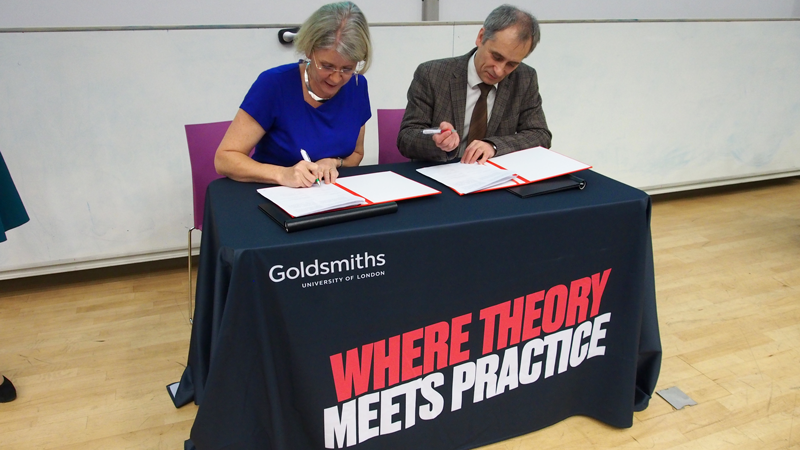Goldsmiths builds more bridges with Tomsk State University at international conference
Primary page content
Goldsmiths, University of London has further extended its long-standing relationship with Tomsk State University (TSU) to include new disciplines and enhanced staff and student mobility between the two institutions.

Jane Powell, Goldsmiths University of London Deputy Warden and Professor Artyom Rykun, TSU Vice-Rector for International Affairs sign agreement.
The agreement was formalised at the Building Bridges conference this week at Goldsmiths.
Fatos Selita, the chair of the conference, who is linked to both Goldsmiths and TSU, stated that the conference establishes different types of ‘bridges’ – across disciplines, across institutions, and from science to society.
The first day of the two day event culminated with the signing of a memorandum of understanding that the two universities extend their relationships into new disciplines, including data mining and computing through to culture and humanities.
The agreement was signed for Goldsmiths by Jane Powell, Deputy Warden and for TSU by Professor Artyom Rykun, Vice-Rector for International Affairs. It also covers enhanced staff and student mobility between the universities, the development of joint research projects and associated funding applications and even possible jointly developed and delivered curricular.
Jane Powell said: “The conference's name, Building Bridges, captures exactly what our universities and all universities are here for. We exist to stimulate and facilitate bridges between scholars and people beyond academia, who have different kinds of knowledge and perspectives. To identify challenges and problems, find solutions and push forward the frontiers of knowledge.
“Approximately 37 per cent of our student body comes from outside the UK, from every continent and, at the last count, from more than 120 countries. We also have around 600 academic staff and about one third are from outside the UK. So we are extremely well placed to make all sorts of bridges, between different countries, regions and interests.
“Signing the memorandum of understanding not only acknowledges our existing cooperation, it puts in place one more brick in the building of a bridge to future partnerships.”
Artyom Rykun said the partnership with Goldsmiths is a perfect match. “Sometimes you just feel it’s right,” he said. “I have lots of reasons to be personally interested in Goldsmiths as I have been teaching Cultural Studies for a number of years. This for me means Scott Lash, Stuart Hall, Richard Hebdige and all the others who formed Cultural Studies – they are very important to me. It’s important that the third wave of British popular music started here and that all the things associated with contemporary culture, contemporary cultural studies, music, and arts are studied and practised here. But it wasn’t until I got here that I realised this is the place which we have to establish a cultural relationship, because it’s very similar to us. It feels right.”
Professor Yulia Kovas – who is Director of InLab at Goldsmiths and Co-Director of the International Centre for Research in Human Development at TSU – was key to organising the event. “It’s a great opportunity for Goldsmiths staff and students to take part in a truly international conference held on their doorstep,” she said. “Participants were invited to propose new ideas for collaborations and submit abstracts, and the programme includes talks by fantastic speakers. Goldsmiths staff will also be able to explore opportunities to collaborate with a leading Russian university as representatives from Tomsk’s Computing, Cultural Studies, Psychology and Law departments are amongst those attending.”
Highlights of the two days also included the inauguration of The Accessible Genetics Consortium (TAGC). This joint venture by InLab at Goldsmiths and the International Centre for Research in Human Development at TSU will communicate genetic knowledge in an accessible way and address its ethical and legal implications to help everyone benefit from genetic discoveries. Its international membership includes researchers from different disciplines and individual academics and institutions are encouraged to join and contribute their expertise.
For more information visit inlab.co.uk or email fatos.selita@emlaw.co.uk.